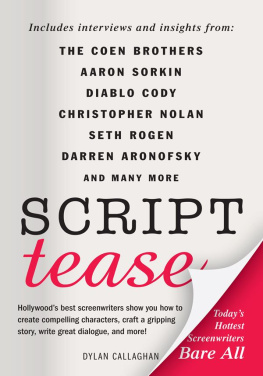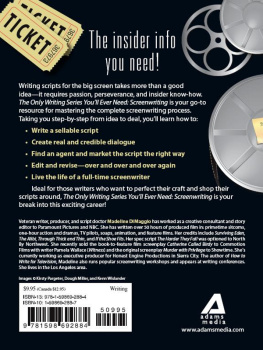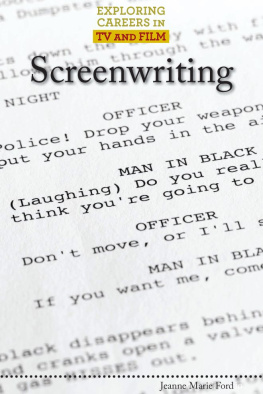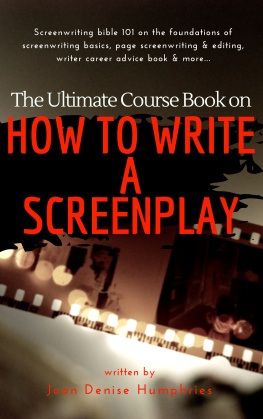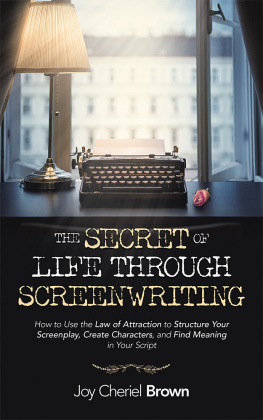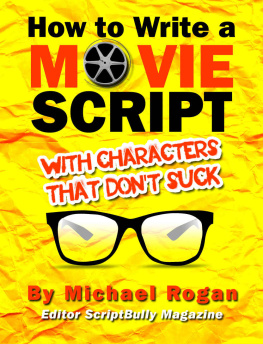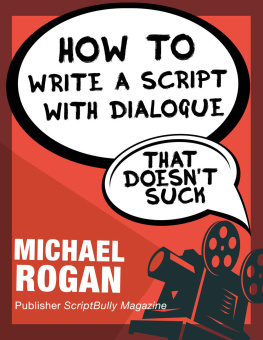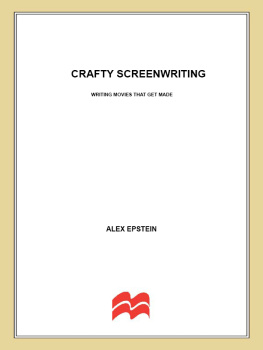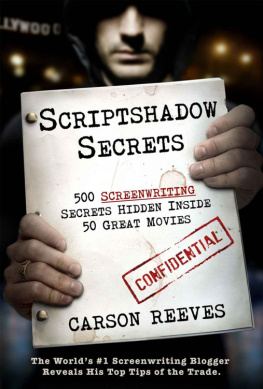DARREN ARONOFSKY
CAREER HIGHLIGHTS:
Black Swan ; The Wrestler ; Pi;Requiem for a Dream
Im kind of a nomadic writer. I like to write in a certain place for a week or two and then Ive gotta move somewhere else My sacred sanctuary is always changing.
DARREN ARONOFSKY
Ever since he rocketed out of the blue into the stratosphere of indie film with 1998s Pi, Darren Aronofsky has been, among other things, an exemplar of the idea that creative success comes through never repeating yourself. During a discussion about his beautifully fabulistic foray into the world of sci-fi love stories, The Fountain, the Harvard-educated Brooklynite talks about everything from his writing process to his love for the Matrix films.
He says that despite being such a visually inclined director, when he is writing, the visual stuff rarely comes into play. And though he loves playing with narrative and genre boundaries, he believes ardently that, no matter how fascinating experimentation is, every successful screenplays journey begins with a great story.
Youve said that its very difficult to know exactly where ideas start. What is your first clear recollection of the idea for The Fountain emerging?
I think it was after seeing The Matrix about two weeks before we started shooting Requiem for a Dream. I saw it and I realized that it was time to do something completely different and new in sci-fi. That was the challenge I set in front of myself.
At the same time, a roommate of mine from college, Ari Handel, had just gotten his PhD in neuroscience and was done with academia. He was interested in writing so I asked him to think about doing something completely new with sci-fi. The two of us started walking around Manhattan thinking and talking and one of the first concepts was [using] the fountain of youth as a starting point. We felt a search for immortality would allow us to do something that spanned time in a different way than a traditional time-travel movie.
But The Matrix kind of got the ball rolling?
Yeah, I think so. I was a fan of sci-fi and felt that the Wachowski brothers had taken most of the great sci-fi ideas of the twentieth century and added a bunch of new ones as well, [and] that it was time to do something very different. That gave us the idea to move away from films about outer space and start doing films about inner space.
And would you say that the focus on inner space is what defines this movie?
Yeah. I think sci-fi in movies has really been hijacked by laser guns, gadgetry, and gimmicks like that. We decided to move away from that. For instance our space bubble is a spaceship thats not at all connected to spaceships from other films. We wanted to get away from jet propulsion and, you know, basically trucks in space.
Youve called this film a puzzle and it does span 1,000 years and three different time periodswithout being reductive, can you tell me what, in the simplest sense, this story is about?
At the core its a love story between Hugh Jackman and Rachel Weisz. Rachels character has terminal brain cancer and is facing an untimely death. Hugh Jackmans character is a research scientist doing work with cancer. He has a possibility of saving her and refuses to accept whats happening to [her].
And in that sense refuses to accept mortality?
Exactly.
INTERVIEWER
As a writer-director youre a visual artistyou have certain key techniques you use in your films: your treatment of sound, montage, etc. When you write are you perpetually visualizing the filmic expression of the words?
DARREN ARONOFSKY
Not always. I think there are certain things that come to me with cool visuals attached, but most of the time when youre a writer, youre a writer, and youre just trying to figure out how the scenes work. Then at a certain point you have to take off your writers cap and put on your directors cap and figure out how you visually execute what youve created on the page. When youre writing, the essential focus is not the visual aspect but just the best way to do a scene.
Do you have any quirky rituals for the actual writing process?
Im kind of a nomadic writer. I like to write in a certain place for a week or two and then Ive gotta move somewhere else.
So you dont have a sacred sanctuary?
No, my sacred sanctuary is always changing.
As a kind of new-wave storyteller who defies convention, how do you navigate the perilous chasm between reinvention and the basic engines of good storytelling?
Theres a constant pull between trying to do something new and trying to keep it understandable for audiences. You dont want to go too far out there where audiences dont get whats going on, but you want to keep things fresh. Theres always going to be people who dont want to see something so new, but I think therere always more people who want to have their minds blown.
How do you know when youve gone too far?
Your first responsibility is to get the story across; if youre not getting a story across then youre doing a disservice to the audience. The bottom line is that a good story must be there, but if the audience is on the ride, then why not push it a little further?
SHANE BLACK
CAREER HIGHLIGHTS:
Kiss, Kiss, Bang, Bang; Lethal Weapon; The Long Kiss Goodnight; Last Action Hero
People have asked, arent you afraid? Ive said, Fuck it, no! [ laughs ] I have nothing to lose. How could it get worse? No one knew my name anymore, who the fuck I was or that I was even still alive So I just jumped in.
SHANE BLACK
When scripting vet Shane Black talks about screenwriting, its existential, brutal, and you can bet, pretty much bang on. He set the bar for a new era of mega screenwriting paydays when, in 1996, he was paid a jaw-slacking $4 million for The Long Kiss Goodnight, which ultimately didnt perform at the box office. He suffered a backlash that sent him into the wilderness.
Here he talks Raymond Chandler, badly written blockbusters, and coming back from Hollywoods Siberia. When you are working, he says, make every day the same and your writing will build momentum. Also, be sure to keep a shoebox where you put every idea you ever have.
What do you feel Kiss, Kiss, Bang, Bang represents in relation to your earlier screenwriting credits?
I think Kiss, Kiss, Bang, Bang is sort of the bastard child of James L. Brooks and Joel Silver, both of whom were very influential in getting me to write this thing. I took lessons from both of them as I wrote it. Its half romantic comedy tempered with murder mystery thats edgy and, at points, I think, even disturbing.
Its also a departure from doing mythic, iconic characters like Mel Gibsons gunslinger in Lethal Weapon and Geena Daviss female avenger in The Long Kiss Goodnight characters writ large, as they say. In this one the mythic figure is sensed but never seen in the Johnny Gossamer character that sort of floats through the movie as an ideal to be attained. But the people trying to fill his shoes are these schmucks who cant. Its one of the first movies Ive done where the people are just people.
The [Robert] Downey character may be a hero with pimples, so to speak, but he still winds up hanging from a corpses arm over an L.A. freeway shooting bad guys with his free hand.
Thats the idea of the movie, that there are no mythical characters until the very end when he actually changes reality. In order to save this girl and rekindle that childhood love he has.

